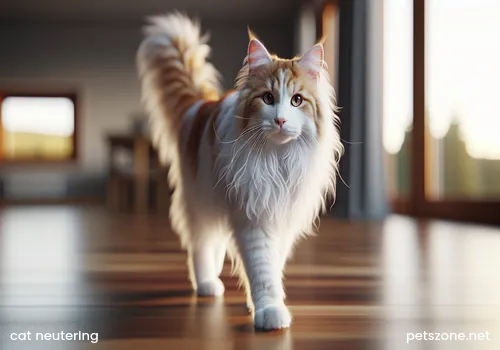Will a Cat's Personality Change After Neutering_Understanding the Impact of Neutering
Many cat owners feel uneasy when deciding to neuter their beloved pet: will this small surgery turn our familiar cutie into a different cat? Will it still act as affectionate as before? Can it still play happily? Ultimately, the biggest concern is always this question—will a cat’s personality change after neutering?
The answer is actually quite concise and dialectical: a cat’s core personality (for example, whether it is naturally clingy or independent) will not fundamentally change after neutering, but hormone-driven specific behaviors will be greatly reduced or disappear, which often makes owners feel like their cat has "changed."

Don’t rush to conclusions; this is not simply about “change” or “no change,” but a deeper understanding of cat behavior logic. Imagine an adult whose body is driven by a strong, cyclical impulse, such as seeking a mate or defending territory; many of his behaviors revolve around these goals. When these hormone levels drop, those impulse-driven behaviors naturally decrease. For cats, neutering removes this powerful hormonal drive.
In intact cats, especially males, the heat period can become extremely restless, showing frequent inappropriate urination (territory marking), calling during heat, strong desire to go outside or even attempting to escape, and increased aggression towards other males. Female cats, though less intense in territorial behaviors, also become agitated with loud nighttime howling, rolling, and trying to go out to find mates during heat, sometimes appearing distressed or losing appetite. These behaviors are physiological instincts dominated by sex hormones.
After surgery, with a significant decrease in sex hormone levels, behaviors related to reproduction and resource competition are the first to be affected:
- Reduced aggression: Especially in male cats, aggression caused by fighting for mates and territory significantly lowers. Female cats also become gentler after neutering as they no longer experience the agitation of heat. According to some veterinary clinical observations and studies, neutering is one of the most effective ways to reduce aggressive behaviors in cats.
- Decreased marking behavior: Male cats will spray urine to mark territory much less, which is a blessing for maintaining household cleanliness. Female cats rarely spray but other marking behaviors during heat will vanish.
- Disappearance of calling/howling during heat: The exhausting cries during heat completely stop.
- Reduced desire to go out: No longer driven by reproductive urges, cats lose interest in the outside world (mainly seeking mates), preferring to stay home, greatly lowering the risk of getting lost, fighting injuries, or infection.
These behavioral changes are easily interpreted by humans as “personality improvements,” such as “it no longer pees around, is less grumpy, and behaves better.” However, this does not mean that the cat’s intrinsic traits, like shyness, affection toward humans, or preferred toys, change. A cat that was shy before neutering might remain shy; a naturally playful and lively cat will still be energetic (just without focusing on finding mates or fighting).
Of course, many cat owners are pleasantly surprised to find their neutered cats become more affectionate and enjoy interaction more. Why is that? This isn’t a personality shift from “independent” to “clingy,” but because they are no longer troubled by strong reproductive drives, anxiety and impulses lessen. They have more energy to focus on other things in the environment, including human companionship and interaction. Simply put, their “mind” shifts from “dating and reproducing” to “enjoying life and cuddling.” This change is more about a shift in behavioral focus and relaxed emotional state than a personality change.
However, everything has two sides. While neutering brings many benefits, there are some changes to watch for:
- Prone to weight gain: Metabolism slightly slows down and activity (such as roaming to find mates) decreases. Without controlled feeding and increased indoor activity, cats can easily become overweight. This is not a sign of laziness but a physiological challenge that owners need to manage through scientific feeding and interaction.
- Rare behavioral changes: Although uncommon, some researchers have observed that a very small number of cats, especially those neutered at a very young age, may become more timid. The reasons are complex and may relate to surgical stress, recovery, individual differences, or even breed predisposition. This is not a general phenomenon and certainly not a reason to refuse neutering. Compared to the severe health and behavioral problems neutering prevents, this risk is negligible.
In summary, neutering does not “remold” a cat’s personality, but by removing hormonal interference, it allows the cat to return to a more natural and relaxed state. Those troublesome “problem behaviors” caused by hormones mostly disappear, enabling cats to better enjoy family life and human connection. Neutering optimizes behavior, making cats healthier, happier, and more harmonious family members. So, when you worry about “change or no change,” it’s better to focus on the huge long-term health and welfare benefits of neutering.
(Note: The above content references multiple veterinarians’ clinical experience, international studies on pet neutering’s impact on behavior, and observations summarized by experienced cat owners.)



